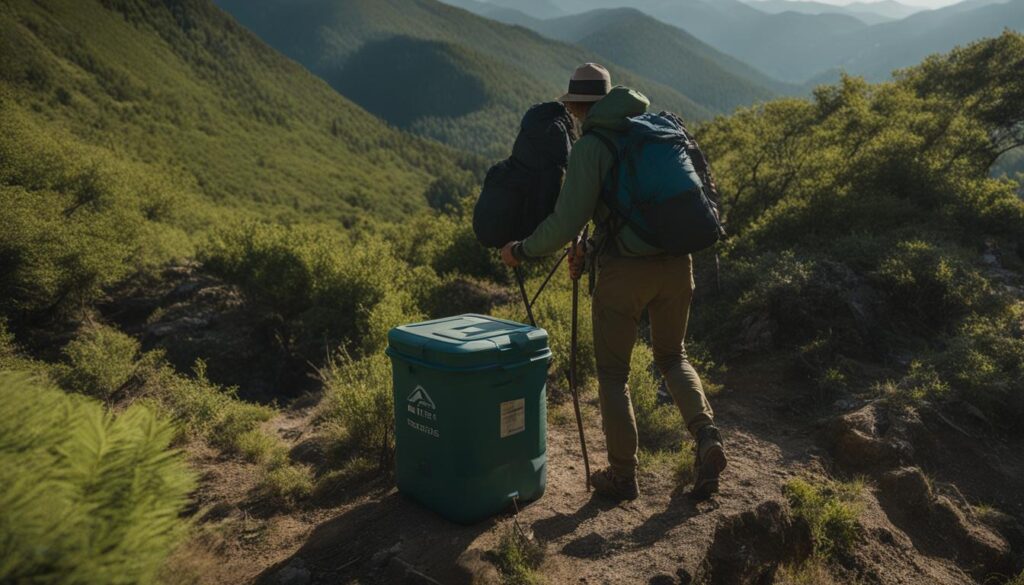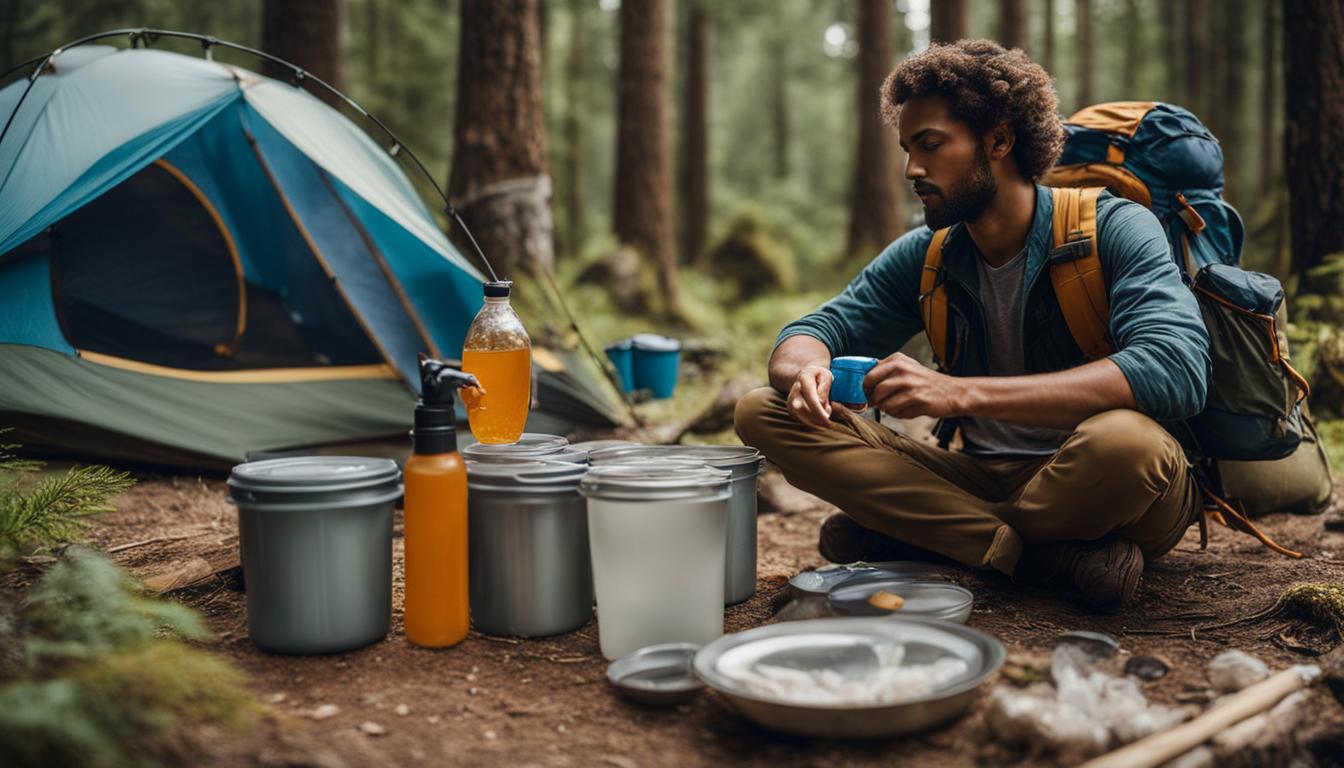When it comes to backpacking, exploring the great outdoors is a thrilling and fulfilling experience. But it’s essential to remember that we have a responsibility to protect the environment as we embark on our adventures. By following responsible backpacking practices, we can minimize our environmental impact and ensure the preservation of nature for future generations.
Key Takeaways:
- Stay on marked trails to prevent damage to foliage and roots.
- Leave no trash behind and pack out what you bring in.
- Maintain a respectful distance from wildlife and refrain from taking natural items.
- Bring a reusable water bottle and pack homemade snacks using local ingredients to reduce waste.
- Clean yourself and gear after each hike to prevent the spread of seeds, insects, or pathogens.
Minimizing Environmental Impact on Hiking Trails

When it comes to hiking, it’s crucial to prioritize minimizing our environmental impact on the trails we explore. By adopting sustainable travel tips and practicing low-impact camping, we can ensure that our outdoor adventures remain eco-friendly.
One of the most important ways to minimize our impact is to stay on marked trails. This helps protect fragile soils and surface vegetation from unnecessary damage. Additionally, it’s essential to avoid feeding wildlife, as human interaction disrupts their natural foraging behaviors and can harm their overall well-being.
The “Leave No Trace” principle serves as a comprehensive guide to responsible hiking. This principle emphasizes the importance of preparing and planning ahead, camping on durable surfaces, disposing of waste properly, respecting native flora and fauna, using established fire rings, being considerate of other visitors, and respecting wildlife.
“Nature provides us with so much beauty and inspiration, and it’s our responsibility to ensure that we’re leaving minimal impact as we explore its wonders.” – My Hiking Journey
Another way to minimize our environmental impact is through conscious choices in our food and waste management. By making and bringing our own food using local ingredients, we reduce packaging waste and support sustainable food practices. Proper waste disposal, such as digging cat holes for human waste or packing it out when necessary, prevents pollution and helps keep the environment clean.
By following these practices and choosing clothing made from sustainable materials, we can further minimize our environmental footprint. Let’s prioritize the preservation of nature while enjoying our outdoor adventures and ensure that future generations can also experience the beauty of hiking trails.
Choosing a Sustainable Approach to Backpacking
When it comes to backpacking, being eco-conscious and practicing sustainable wilderness practices is essential to protect nature and ensure eco-friendly outdoor adventures. Here are some tips to help you make responsible choices while backpacking:
Bring reusable gear
One of the easiest ways to reduce your environmental impact is by bringing reusable gear. Invest in a high-quality water bottle that you can refill throughout your trip, minimizing the need for single-use plastic bottles. Opt for eco-friendly camping utensils and containers that can be washed and used again, instead of disposable options.
Choose local and sustainable
Support local communities and reduce your carbon footprint by choosing local hikes and backpacking spots. Carpooling or using public transportation to reach your destination also helps minimize emissions. Additionally, opt for sustainable food practices by making your own meals with local ingredients. This reduces packaging waste and supports the local economy.
Follow the “Leave No Trace” principle
The “Leave No Trace” principle is a set of guidelines that promote responsible backpacking practices. It includes leaving the environment as you found it, without disturbing flora and fauna. This means staying on marked trails, camping on durable surfaces, properly disposing of waste, and respecting wildlife. By following these principles, you can help preserve the natural beauty of hiking trails for future generations.
Minimize waste and pollution
Take steps to minimize waste and pollution during your backpacking trips. Pack out all trash, including food waste, and dispose of it properly. Dig cat holes for human waste, away from water sources, and use biodegradable soap when washing dishes to minimize water pollution. Also, keep fires small and avoid burning plastics or other non-biodegradable materials.
| Benefits of a Sustainable Approach to Backpacking | Eco-Conscious Backpacking |
|---|---|
| Reduced plastic waste | Supports local communities |
| Lower carbon footprint | Preserves natural beauty |
| Protection of wildlife | Minimizes waste and pollution |
By choosing a sustainable approach to backpacking, you can enjoy outdoor adventures while protecting nature and minimizing your environmental impact. Remember to bring reusable gear, choose local and sustainable options, follow the “Leave No Trace” principle, and minimize waste and pollution. Let’s all do our part to ensure the beauty of our natural landscapes for future generations.
Conclusion
Being a responsible backpacker means protecting nature while enjoying outdoor adventures. By following sustainable travel tips and responsible backpacking practices, we can minimize our impact on the environment.
One of the key aspects of responsible backpacking is to practice ‘Leave No Trace’ principles. This includes staying on marked trails, leaving no trash behind, and respecting wildlife. By doing so, we can preserve the natural beauty of hiking trails and protect the delicate ecosystems they contain.
Another important aspect is making sustainable choices. Using reusable water bottles, packing homemade snacks, and supporting local sustainable brands are simple yet effective ways to reduce our environmental footprint. Additionally, choosing environmentally friendly gear and clothing made from sustainable materials further contributes to responsible backpacking.
Let’s remember that protecting nature while backpacking is not only beneficial for the environment but also for future generations. By being responsible backpackers, we can ensure that the wonders of nature are preserved and enjoyed by all. So, let’s embrace sustainable travel tips and continue to enjoy the great outdoors while protecting the places we love.

